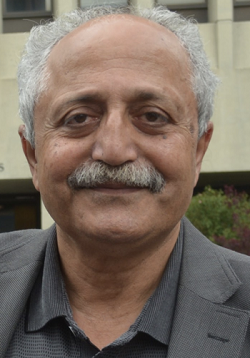
Call for Participation
How do AI and LLMs change our lives? Reflections and outlook
Sunday, 30 June 2024 - 08:30am -12:30pm
Organizers
Helmut Degen
Siemens Corporation, United States
helmut.degen@siemens.com
Abbas Moallem
Charles W. Davidson College of Engineering, San Jose State University, USA
abbas.moallem@sjsu.edu
Stavroula Ntoa
Foundation for Research & Technology - Hellas (FORTH), Greece
stant@ics.forth.gr
As a result of the latest developments in Generative Artificial Intelligence and Large Language Models applications, like ChatGPT and Bard, millions of people started using them. Even more people are interested in using them. These are people from all walks of life, including students, academics, engineers, lawyers, designers, writers, media experts, programmers, politicians, artists, and private citizens across the globe.
The purpose of this workshop is to bring together, for knowledge sharing, practitioners, researchers, and scholars in the field of AI, Natural Language Processing, and HCI. The focus of the workshop will be to elaborate on the impact of Large Language Models on our lives, exploring the multifaceted implications of these technologies on daily activities, the industry, academia, and society as a whole.
The workshop aims to facilitate knowledge sharing between practitioners, researchers, and scholars in the field of AI, while working on the currently popular topic of Natural Language Processing and Large Language Models.
Furthermore, participating authors will have the option of publishing the outcomes of the workshop in a chapter of a book that will be edited by the Workshop organizers.
Topics of interest include but are not limited to:
The workshop will span four hours comprising two parts.
The first part will begin with a short introduction by the workshop organizers, to be followed by position talks by participants, presenting their work on the workshop topic.
The second part will be an interactive session for reflections and outlook.
The following is a framework for the program of the workshop:
|
Time |
Program event |
|
08:30 – 08:45 |
Welcome and introductions |
|
08:45 – 10:30 |
Position talks by participants |
|
10:30 – 11:00 |
Refreshment Break |
|
11:00 – 11:45 |
Reflections on the position talks |
|
11:45 – 12:15 |
Outlook on the workshop topic |
|
12:15 – 12:30 |
Workshop wrap up |
Prospective authors should submit their proposals in PDF format through the HCII Conference Management System (CMS). You are welcome to submit your ideas exploring the workshop topics in the form of short papers, research in progress whitepapers, and abstracts.
The contributions to be presented in the context of Workshops will not be automatically included in the Conference proceedings.
However, after consultation with the Workshop Organizer(s), authors of accepted workshop proposals that are registered for the conference are welcome to submit, through the HCII Conference Management System (CMS), an extended version of their workshop contribution to be considered, following further peer review, for presentation at the Conference and inclusion in the “Late Breaking Work” conference proceedings, either in the LNCS as a long paper (typically 12 pages, but no less than 10 and no more than 20 pages), or in the CCIS as a short paper (typically 6 pages, but no less than 4 and no more than 11). The submission deadline for the camera-ready papers (long or short) for the “Late Breaking Work” Volumes of the Proceedings is the 24th of May 2024.
|
Submission of workshop contributions |
19 April 2024 |
|
Authors notified of decisions on acceptance |
3 May 2024 |
|
Finalization of workshop organization and registration of participants |
10 May 2024 |

Helmut Degen
Dr. Helmut Degen is Senior Key Expert for User Experience at Siemens Corporation, Princeton, NJ, USA. Helmut’s research topics are trust, value, and efficiency. He conducts explainable AI (XAI) research at Siemens with a focus on human-computer interaction. Helmut is also the co-chair of the yearly, international conference on Artificial Intelligence in Human-Computer Interaction (AI-HCI) affiliated with the HCI International Conference. He has received a Masters of Science (in German “Diplom-Informatiker”) from the Karlsruhe Institute of Technology and a PhD in Information Science from the Freie Universität Berlin (both in Germany).

Abbas Moallem
Dr. Abbas Moallem is executive consultant and adjunct professor at San Jose State University, California State University, East Bay, where he teaches human computer interaction, cybersecurity, information visualization and human factors. Abbas has over 30 years of experience in the fields of human factors, ergonomics, human-computer interaction (HCI), and usability. He has also served as a senior engineering product manager and usability expert at NETGEAR, a UI Architect at PeopleSoft and Oracle Corporation. Tumbleweed and Axway for over 11 years. Abbas has consulted a variety of industries in Europe, Canada, and the USA. Dr. Moallem holds a Ph.D. in Human Factors and Ergonomics from the University of Paris (Paris XIII), a Master degree in Biomechanics from the University of Creteil (Paris XI), and a Master's degree in Ergonomics from the Conservatoire Nation des Arts et Métiers in Paris, France. Dr. Moallem obtained his B.A. degree from the University of Tehran in 1978. He currently serves as Program Chair of “Human Factors in Cybersecurity at the HCI International and the Applied Human Factors and Ergonomics International conferences. Abbas is the program chair of the HCI-CPT:5th International Conference on HCI for Cybersecurity and Trust. He is the author and editor of several articles and books. He is also a series editor of Smart and Intelligent System series at CRC / Routledge.

Stavroula Ntoa
Dr. Stavroula Ntoa is a computer scientist specialized in usability engineering, User Experience (UX) research and design, and software accessibility. She holds a Ph.D. in “Information Systems and Human-Computer Interaction”, and an M.Sc. in “Information Systems” and “Computer Networks and Digital Communications” from the Computer Science Department of the University of Crete, Greece. Currently, she is a post-doctoral researcher at the HCI Laboratory of the Institute of Computer Science of FORTH, conducting research on adaptive and intelligent interfaces, universal access and accessibility of modern interactive technologies, and user experience research in intelligent and Artificial Intelligence environments. She is also co-chair of the yearly, international conference on Artificial Intelligence in Human-Computer Interaction (AI-HCI) affiliated with the HCI International Conference.
Fan, Z., Gao, X., Mirchev, M., Roychoudhury, A., & Tan, S. H. (2023, May). Automated repair of programs from large language models. In 2023 IEEE/ACM 45th International Conference on Software Engineering (ICSE) (pp. 1469-1481). IEEE.
Kasneci, E., Seßler, K., Küchemann, S., Bannert, M., Dementieva, D., Fischer, F., ... & Kasneci, G. (2023). ChatGPT for good? On opportunities and challenges of large language models for education. Learning and individual differences, 103, 102274.
Liu, Y., Han, T., Ma, S., Zhang, J., Yang, Y., Tian, J., ... & Ge, B. (2023). Summary of chatgpt-related research and perspective towards the future of large language models. Meta-Radiology, 100017.
Lund, B. D., & Wang, T. (2023). Chatting about ChatGPT: how may AI and GPT impact academia and libraries?. Library Hi Tech News, 40(3), 26-29.
Ozdemir, S. (2023). Quick Start Guide to Large Language Models: Strategies and Best Practices for Using ChatGPT and Other LLMs. Addison-Wesley Professional.
Shen, Y., Heacock, L., Elias, J., Hentel, K. D., Reig, B., Shih, G., & Moy, L. (2023). ChatGPT and other large language models are double-edged swords. Radiology, 307(2), e230163.
Workshops will run as 'hybrid' events. Participants will have the option to attend either in-person or virtually. The total number of participants per workshop cannot be less than 8 or exceed 25.
Workshops are ‘closed’ events, i.e. only authors of accepted workshop proposals, registered for the specific workshop, will be able to attend.
Registration for workshops is complimentary for registered conference participants.